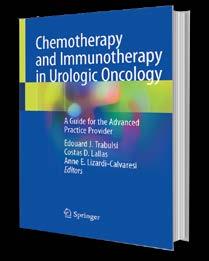
4 minute read
Clinical Trials Update
Dr. Ryan Mark, Director of Clinical Trials, evaluating a tumor specimen in the operating room as part of a clinical trial enrolment process.
The Covid-19 pandemic effects of social distancing and other necessary public health efforts have likewise impacted clinical research activities. Despite the obvious hurdles, the Department of Urology has continued its commitment to conducting clinical research over the last year.
During the pandemic, we enrolled 10 patients to SWOG 1602 (NCT03091660). This phase III study explores the effect of standard of care BCG vs. a Tokyo BCG strain previously unavailable in the US. As a result, we have been able to offer full strength BCG and three years of maintenance to our patients with high-risk non-muscle invasive bladder cancer (NMIBC) despite the global BCG shortage. As this trial nears accrual goals, we hope to see FDA approval of the Tokyo strain of BCG further improving patient access to intravesical BCG.
For those patients where BCG has failed to control their bladder cancer, we continue to offer intravesical BCG + IL 15 super-agonist through Quilt-3.032 (NCT03022825) as an alternative to radical cystectomy or other salvage therapy. Our prostate cancer patients have also continued to benefit from our robust prostate cancer clinical trial portfolio managed in partnership with our Sidney Kimmel Cancer Center medical and radiation oncology colleagues.
• Specific to the Department of Urology, we have been examining the role of multiparametric MRI prior to prostatectomy (NCT03697148). • We continue to recruit for the SUO-CTC
Priority trial (Society of Urologic Oncology-
Clinical Trials Consortium) testing the ability of current biomarkers to help men avoid unnecessary prostate biopsies. • Molecular-based PSMA PET imaging trial sponsored by the National Cancer
Institute (NCI) is bringing this exciting new imaging technology to patients in the
Philadelphia region. The trial is: Prostate
Specific Membrane Antigen (PSMA)-Based
PET Imaging of High Risk Prostate Cancer (NCT03976843).
Our department’s clinical research program also participated in two important multiinstitutional trials that were published in highprofile journals in 2020.
• Dr. Scott Hubosky was a co-investigator on the OLYMPUS clinical trial that led to the
FDA approval of a mitomycin-containing reverse thermal gel (Jelmyto™) for upper tract urothelial carcinoma. “Primary chemoablation of low-grade upper tract urothelial carcinoma using UGN-101, a mitomycin-containing reverse thermal gel (OLYMPUS): an open-label, single-arm, phase 3 trial” was published in Lancet
Oncology in June 2020 with our former endourology fellow Dr. Nir Kleinmann as first author. • A landmark intravesical gene therapy trial was also published in Lancet
Oncology in November 2020: “Intravesical nadofaragene firadenovec gene therapy for BCG-unresponsive non-muscleinvasive bladder cancer: a single-arm, open-label, repeat-dose clinical trial.” Dr.
Leonard Gomella served as principle investigator at Jefferson for this SUO-CTC trial with our Department registering and tying for the second highest accrual in US for this novel agent, nadofaragene firadenovec (Astiladrin™) in patients with
BCG unresponsive NMIBC. This agent is currently under evaluation by the FDA.
If approved would represent the first gene therapy product for bladder cancer.
A searchable list of our available clinical trials is available for review at Jefferson’s Study Information Portal (SIP, for short) through the site ctmssip.tju.edu/sip/SIPMain). If you have a patient you would like to refer or require more information on a particular trial please contact Dr. J. Ryan Mark (james.mark@jefferson.edu), Director of Clinical Trials for the Department of Urology.
We are also pleased to welcome our new clinical trials coordinator, Olivia Dahlgren, BS, Clinical Trials Coordinator (pictured). Olivia joined the department in early 2021 and is available for questions or to assist with any trial eligible patient referrals at olivia.dahlgren@ jefferson.edu. Olivia’s work cell number is 267343-6558. In addition to our extensive portfolio of oncology trials, we look forward to Olivia helping to help expand availability of nononcology studies.
R01 NCI Grant Award
This five-year study will develop a simple urine test for prostate cancer.
Mathew Thakur, PhD and Edouard Trabulsi, MD, MBA, were awarded R01 funding as coprimary investigators from the National Cancer Institute on September 1, 2020 (1R01CA24992), for their proposal titled, “NONINVASIVE, UNIPLEX, MOLECULAR, PATHOMIC URINARY ASSAY FOR DETECTION OF PROSTATE CANCER.” This five-year grant, totaling $3.1 million, is the culmination of several years of collaboration between Dr. Thakur’s laboratory in the Department of Radiology and the Department of Urology.
The grant is based upon the concept of detecting shed-tumor cells in body fluids. The concept, which was originally developed by Drs. Gomella and Thakur, builds on the previous years of Dr. Thakur’s work evaluating peptide analogs of the ligand for VPAC [vasoactive intestinal peptide (VIP)/pituitary adenylate cyclase activating peptide (PACAP)]. VPAC is a cell surface receptor significantly upregulated in malignant epithelial cells such as prostate cancer. This proposal will examine shed cells in the urine, which are labeled with VPAC receptor ligand peptide analogs conjugated to an optical fluorophore, developed by Dr. Thakur, to accurately predict the presence of prostate cancer shed cells using fluorescent microscopy. Jefferson holds multiple patents on this technology.
Some of the early pilot work in this area was supported by a Philadelphia Prostate Cancer Biome Project Pilot grant (see page32). The ultimate goal is to evolve this innovative concept into a simple and low cost non-invasive urinary assay for prostate cancer detection.








